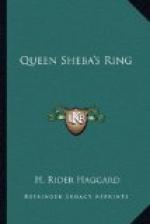“So you are willing to go?” said Orme. “But I hope you clearly understand that this is a risky business, and that you may not come back?”
“Spion Kop was a bit risky, Captain, and so was that business in the donga, where every one was hit except you and me and the sailor man, but we came back, for all that. Begging your pardon, Captain, there ain’t no such thing as risk. Man comes here when he must, and dies when he must, and what he does between don’t make a ha’porth of difference.”
“Hear, hear,” I said; “we are much of the same way of thinking.”
“There have been several who held those views, sir, since old Solomon gave the lady that”—and he pointed to Sheba’s ring, which was lying on the table. “But excuse me, Captain; how about local allowances? Not having been a marrying man myself, I’ve none dependent upon me, but, as you know, I’ve sisters that have, and a soldier’s pension goes with him. Don’t think me greedy, Captain,” he added hastily, “but, as you gentlemen understand, black and white at the beginning saves bother at the end”—and he pointed to the agreement.
“Quite right. What do you want, Sergeant?” asked Orme.
“Nothing beyond my pay, if we get nothing, Captain, but if we get something, would five per cent. be too much?”
“It might be ten,” I suggested. “Sergeant Quick has a life to lose like the rest of us.”
“Thank you kindly, sir,” he answered; “but that, in my opinion, would be too much. Five per cent. was what I suggested.”
So it was written down that Sergeant Samuel Quick was to receive five per cent. of the total profits, if any, provided that he behaved himself and obeyed orders. Then he also signed the agreement, and was furnished with a glass of whisky and water to drink to its good health.
“Now, gentlemen,” he said, declining the chair which Higgs offered to him, apparently because, from long custom, he preferred his wooden-soldier attitude against the wall, “as a humble five-per-cent. private in this very adventurous company I’ll ask permission to say a word.”
Permission was given accordingly, and the Sergeant proceeded to inquire what weight of rock it was wished to remove.
I told him that I did not know, as I had never seen the Fung idol, but I understood that its size was enormous, probably as large as St. Paul’s Cathedral.
“Which, if solid, would take some stirring,” remarked the Sergeant. “Dynamite might do it, but it is too bulky to be carried across the desert on camels in that quantity. Captain, how about them picrates? You remember those new Boer shells that blew a lot of us to kingdom come, and poisoned the rest?”
“Yes,” answered Orme; “I remember; but now they have stronger stuffs—azo-imides, I think they call them—terrific new compounds of nitrogen. We will inquire to-morrow, Sergeant.”
“Yes, Captain,” he answered; “but the point is, who’ll pay? You can’t buy hell-fire in bulk for nothing. I calculate that, allowing for the purchase of the explosives and, say, fifty military rifles with ammunition and all other necessaries, not including camels, the outfit of this expedition can’t come to less than L1,500.”




